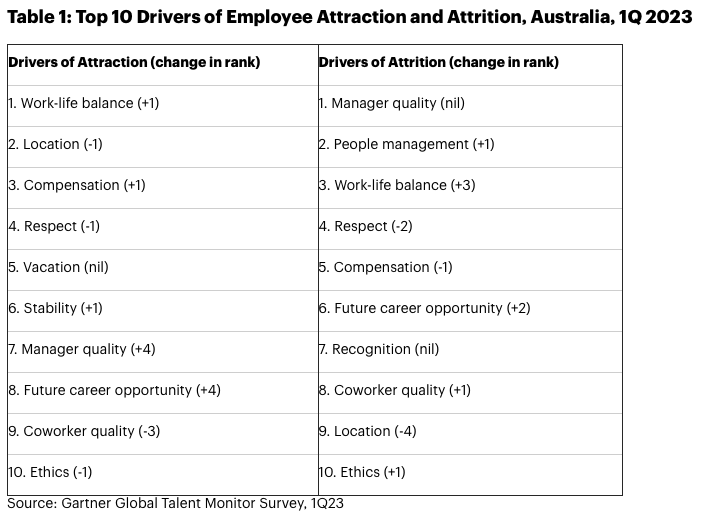July 18, 2023
Australian employees are increasingly likely to change jobs during the months ahead as rising interest rates and cost of living pressures trigger a need to chase bigger pay packets to stay “financially viable”.
According to Gartner research, financial wellness has plummeted to an “all-time low” for local talent, declining for the second consecutive quarter from 28% to 24.4%.
Such a downward turn in market conditions is expected to result in more staff becoming “flight risks” in the pursuit of higher value employment contracts.
“With rising inflation showing no signs of slowing, many Australians are facing serious financial hardship, which is not only incredibly distressing personally, but significantly impacts their work life too,” said Aaron McEwan, Vice President at Gartner.
“As wages remain stagnant and few bonuses on offer, organisations risk losing employees as they prioritise household budget needs.”

Citing Gartner’s latest Global Talent Monitor survey data – collected between January and March 2023 – McEwan said active job search behavior increased during the first quarter of the year by 2% in Australia. This is despite business confidence falling from 41.7% to 39.7% and employee perceptions of job availability staying the same at 57.6%.
Compared to the third quarter of 2022, work-life balance replaced location as the top factor employees are looking for in a job during the months ahead, followed by compensation.
When quizzed on reasons to switch jobs, manager quality held strong this quarter, followed by people management and work-life balance, which made a reappearance back into the top three at the start of this year.
Future career opportunity rose two places, which McEwan said demonstrates that employees are not afraid to leave their current role.
“In the current economic environment, it’s risky for employees to jump ship as it’s usually ‘last one in, first one out’,” McEwan added. “However, if they’re struggling financially and are faced with a poor manager, it’s possible they will take a chance.”

For McEwan, Gartner’s latest survey data is reflective of a workforce that has become “exhausted and unproductive”.
“Workers are seeking great leaders that demonstrate empathetic leadership traits,” he noted. “Employees have faced a considerable amount of personal and financial turbulence in the past six months and they’re calling on their leaders to show genuine care, respect and concern.
“Organisations can help alleviate this stress by extending employee programs that support them, such as financial planning services that offer access to financial advice, or the option to stay at home to save on commuting costs.”
In a note to technology providers in Australia, McEwan advised companies to “forget forced socialisation in the office”.
Because as the ‘new normal’ for hybrid working arrangements settles down, many organisations are starting to lure staff back into the office for collaboration and innovation. However, by doing so, companies are placing additional financial strain on employees that are already struggling.
“Work-life balance remains a driving force when employees are deciding whether to stay in their current role or move on,” McEwan advised.
“Employers pushing workers into the office should provide a clear rationale and consider funding social gatherings as an unnecessary commute just adds further financial stress to those finding it tough.”
Inform your opinion with executive guidance, in-depth analysis and business commentary.